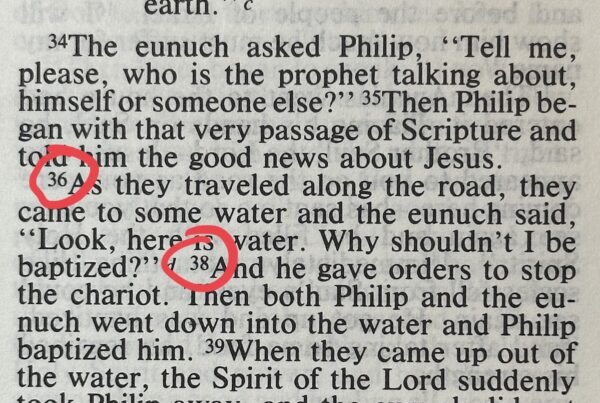“Spiritual vertigo” – that’s what a friend of mine calls it. It’s that dizzying feeling you get when you suddenly sense that the arguments or claims you’re hearing have knocked you off your spiritual moorings, leaving you wondering what you can really believe in and how you can be sure. If you haven’t felt the doubts and anxiety associated with spiritual vertigo yet, you probably will—regardless of what you believe.
Our culture is bent on the idea of questioning everything, including whatever it is you’re currently trusting in. The process of examining your beliefs can be very unsettling. On the other hand, it can force you to refine your assumptions and beliefs in order to make sure you know where they are pointed and why.
This happened to me years ago, when I took my Introduction to Philosophy class in college. I felt like I was in way over my head. As a business major, I wasn’t sure I should even be trying to interact with what seemed at the time to be such lofty and out-of-reach ideas about knowledge, truth, “metaphysics,” and faith.
Then one day our professor stood in front of our class and systematically challenged what he called the traditional view of God. He proclaimed that the concept of an eternal, unchanging, all-powerful God was based on ideas from a book – the Bible – that was written by hopelessly flawed human beings, had been edited and embellished over time, and was full of factual errors and contradictions.
I wanted to refute what the professor was saying, but the thought of getting up and challenging this learned teacher made my knees grow weak and mouth go dry. Worse yet, I realized I didn’t really know what to say. I didn’t agree with him, but I didn’t know how to refute his claims. I felt intimidated and spiritually insecure.
What bothered me most as I left class that day was the realization that I hadn’t ever thought deeply about many of the beliefs I’d grown up with. I’d accepted most of them by simple trust, expecting that my parents and teachers had told me the truth. But now I needed to know, in real terms, whether it made sense to hold on to my beliefs about God, Jesus, the Bible, and the message of divine grace and forgiveness.
I wasn’t anxious to throw away what I’d been taught, but I didn’t want to take it all on faith, either. In short, I needed – and maybe you need – to find out whether there is a real basis for believing any of these things. Put another way, I needed to know reasons why my faith made sense.
You may have grown up with a background similar to mine. Or you may have been taught to hold very different religious views, or none at all. You might be reading this and realizing that you, too, have accepted most of your beliefs by simple trust, expecting that your parents and teachers have told you the truth without considering the claims seriously for yourself. But no matter what we grew up thinking about existential questions, the truth is that we all believe something. And as I did back in Intro to Philosophy, at some point we must each face the same issues: Is there meaning to life? Does faith make sense? Can logic or evidence point me toward a trustworthy set of beliefs? If so, which one?
So what did I do? I realized that I needed to do my homework – not just for my class assignments, but more importantly to get answers to my most pressing spiritual questions. I ended up studying a number of books that went into real depth in addressing the questions that concerned me. This served to dramatically reinforce my faith – even to the point of being able to go back and challenge my professor concerning many of the things he had said, as well as to encourage my fellow classmates with some of the answers that I had found.
The irony is that after that rocky foray into the field of philosophy, and after completing my bachelor’s degree in business management, I ended up earning my master’s degree in philosophy of religion – and I have been speaking and writing in this area ever since.
It is my sincere hope that what you read on this website as well as in some of the books we recommend will provide you with the reasons you need to overcome any spiritual vertigo you may be feeling, and to find a clear and confident faith. Please read with an open heart and a receptive mind. And as you proceed, be mindful of the promise Jesus made in Luke 11:9-10:
And so I tell you, keep on asking, and you will receive what you ask for. Keep on seeking, and you will find. Keep on knocking, and the door will be opened to you. For everyone who asks, receives. Everyone who seeks, finds. And to everyone who knocks, the door will be opened.
–Mark Mittelberg is an international speaker and the bestselling author of The Questions Christians Hope No One Will Ask (With Answers), Confident Faith, and The Reason Why Faith Makes Sense.
Mark’s story has been adapted from his book, The Reason Why Faith Makes Sense, which he wrote in order to help fellow doubters find answers to their spiritual questions and, more importantly, to find a relationship with the One who is, himself, the ultimate answer to all our needs.





